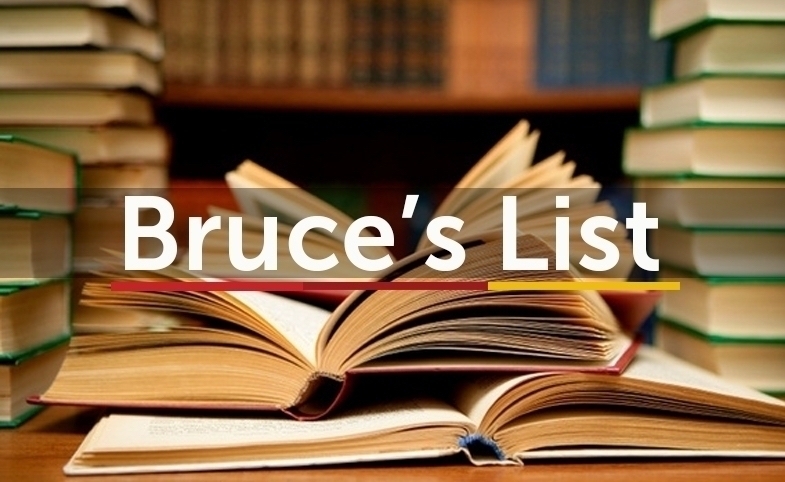
Latest Must-Reads in Public Diplomacy: April 2021
CPD Faculty Fellow Bruce Gregory has compiled a list of the latest must-reads in public diplomacy. Known affectionately at CPD as "Bruce's List," this list is a compilation of books, journal articles, papers and blog posts on a wide variety of PD topics, including Chinese soft power and virtual diplomacy.
Highlights from the latest list include:
Mathieu R. Faupin and Nicholas J. Cull, “Law, Soft Power and Reputational Security: The Case of English Law,” The Mena Business Law Review, First Quarter, 2021. Soft power, a concept introduced in 1990 by Harvard University’s Joseph Nye still compels widespread attention three decades on. Younger scholars vigorously debate its continued relevance – with reasoned argument and in the time-honored way successor generations challenge conventional wisdom. Senior scholars look for ways to put old wine in new bottles. In this brief article, Faupin (Al Sulaiti Law Firm, Doha) and Cull (University of Southern California) discuss soft power through three prisms: law as a source of soft power, English contract law as a soft power asset for the UK, and the concept of reputational security. The article is useful for its contextualizing of Nye’s ideas that soft power can be gained and lost and that its sources are deeply rooted in governance and society (e.g., law, norms, language, education, science, sport) as well as government exports. It also clearly explains reputational security, Cull’s term for security that is derived from “being known for something positive internationally,” an asset that becomes less efficacious when an actor’s positive image is tarnished.
“Interim National Security Guidance,” The White House, March 2021. In what may be the Biden/Harris administration’s draft of what will become its Congressionally-mandated national security strategy, there are several key takeaways.
- Americans will succeed in advancing their interests and upholding their “universal values” only if they meet global challenges by working with allies and renewing sources of strength at home.
- The U.S. will “lead with diplomacy” as “our tool of first resort” – rhetoric that sits uneasily with four centuries of American history.
- The U.S. and other democracies under siege, must lead by example and address systemic racism and other problems at home.
- “Economic statecraft” is added to diplomacy, development, and military force as a leading instrument of American foreign policy.
- In keeping with recent administrations, “public diplomacy,” not mentioned, seems assumed to be integral to diplomacy.
- Traditional distinctions “between foreign and domestic – and among national security, economic security, health security, and environmental security – are less meaningful than ever before.”
- To reflect this new reality, the U.S. will “reform and rethink our agencies, departments, interagency processes, and White House organization.”
Anne-Marie Slaughter and Gordon LaForge, “Opening Up the Order: A More Inclusive International System,” Foreign Affairs, March/April 2021, 154-162. Slaughter (CEO of New America) and LaForge (Princeton University) give new life to a compelling idea that Slaughter developed nearly two decades ago in her book, A New World Order (2005). She described it as the “disaggregation of the state” into component executive, legislative, judicial, and sub-national parts. Government regulators, lawmakers, judges, mayors, and civil society organizations were working together in governance networks parallel to formal networks of state-based institutions. These new governance actors inevitably were becoming new diplomacy actors. Both the state based international order (with formal legitimacy, but often ineffective) and an evolving complex networked order (more participatory, nimble, and innovative, but less accountable) are necessary to confront global threats and challenges. Using responses of both orders to COVID-19 and other global health issues, Slaughter and LaForge explore the dynamics of a new networked liberal order with new actors, new connections, incentivized problem-solving hubs, global networks of mayors and governors, and clear metrics that judge practical results. There are ample research opportunities in this space for diplomacy scholars and practitioners.
Paweł Surowiec and Ilan Manor, eds., Public Diplomacy and the Politics of Uncertainty, (Palgrave Macmillan, 2021). Surowiec (University of Sheffield) and Manor (University of Oxford) have compiled a wide-ranging collection of essays that focus on how uncertainties driven by political extremism, pandemic disease, weaponized digital technologies, rejection of globalization, societal tensions, a post-truth culture, and other global trends are changing multiple elements of public diplomacy. Framed in a foreword by James Pamment (Lund University), chapters include: Nick Bryant, When America Stopped Being Great: A History of the Present, (Bloomsbury Continuum, 2021). The BBC’s veteran foreign correspondent, now based in New York, provides an outsider’s “tough love” chronicle of the “downward trend lines in almost every aspect of national life” during the four decades from Ronald Reagan’s “morning again in America” to Donald Trump’s “American carnage” and the January 6 insurrection at the Capitol. Bryant writes from personal experiences and with an accomplished journalist’s skill. Stories and biting insights populate a narrative that takes an unflinching look at America’s dysfunctional politics, the media, and other institutions in American life where “Virtually every sector is in a reputational ditch.” Bryant recognizes the epic contradictions in American history. He grants that past rebounds followed episodic down turns. He finds this no guarantee for the future. For Bryant, America’s decline is “likely irreversible.”
The full list for the 106th edition of Bruce's List can be found here.
Visit CPD's Online Library
Explore CPD's vast online database featuring the latest books, articles, speeches and information on international organizations dedicated to public diplomacy.
Popular Blogs
-
January 29
-
January 20
-
December 17
-
January 28
-
January 2







